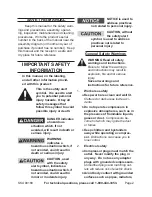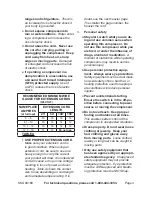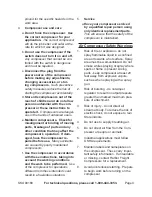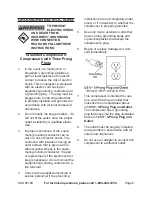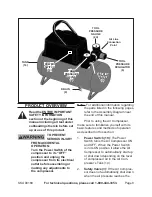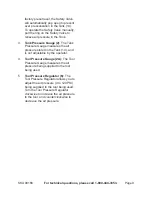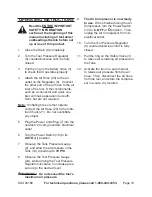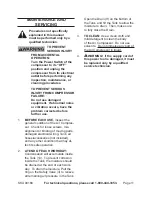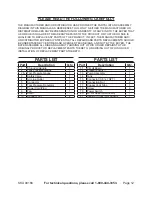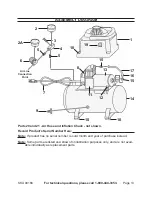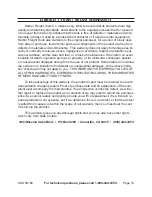
SKU 90168
For technical questions, please call 1-800-444-3353.
Page 3
ranges and refrigerators. There is
an increased risk of electric shock if
your body is grounded.
do not expose compressors to
c.
rain or wet conditions. Water enter-
ing a compressor will increase the
risk of electric shock.
do not abuse the cord. never use
d.
the cord for carrying, pulling or
unplugging the compressor. Keep
cord away from heat, oil, sharp
edges or moving parts. Damaged
or entangled cords increase the risk
of electric shock.
if operating a compressor in a
e.
damp location is unavoidable, use
a ground Fault Circuit interrupter
(gFCi) protected supply. Use of
a GFCI reduces the risk of electric
shock.
ReCOMMended MiniMuM WiRe
gauge FOR eXtensiOn CORds
(120 VOlt)
naMePlate
aMPeRes
(at full load)
eXtensiOn CORd
lengtH
25’
50’ 100’ 150’
0 – 6
18
16
16
14
6.1 – 10
18
16
14
12
10.1 – 12
16
16
14
12
12.1 – 16
14
12
do not use.
taBle a
use PROPeR eXtensiOn CORd.
f.
Make sure your extension cord is
in good condition. When using an
extension cord, be sure to use one
heavy enough to carry the current
your product will draw. An undersized
cord will cause a drop in line voltage
resulting in loss of power and over-
heating. Table A shows the correct
size to use depending on cord length
and nameplate ampere rating. If in
doubt, use the next heavier gage.
The smaller the gage number, the
heavier the cord.
Personal safety
3.
stay alert, watch what you are do-
a.
ing and use common sense when
operating this compressor. do
not use this compressor while you
are tired or under the influence of
drugs, alcohol or medication. A
moment of inattention while operating
compressors may result in serious
personal injury.
use personal protective equip-
b.
ment. always wear eye protection.
Safety equipment such as dust mask,
non-skid safety shoes, hard hat, or
hearing protection used for appropri-
ate conditions will reduce personal
injuries.
Prevent unintentional starting.
c.
ensure the switch is in the off-po-
sition before connecting to power
source or moving the compressor.
do not overreach. Keep proper
d.
footing and balance at all times.
This enables better control of the
compressor in unexpected situations.
dress properly. do not wear loose
e.
clothing or jewelry. Keep your
hair, clothing and gloves away
from moving parts. Loose clothes,
jewelry or long hair can be caught in
moving parts.
Only use safety equipment that
f.
has been approved by an appropri-
ate standards agency. Unapproved
safety equipment may not provide
adequate protection. Eye protection
must be ANSI-approved and breath-
ing protection must be NIOSH-ap-


